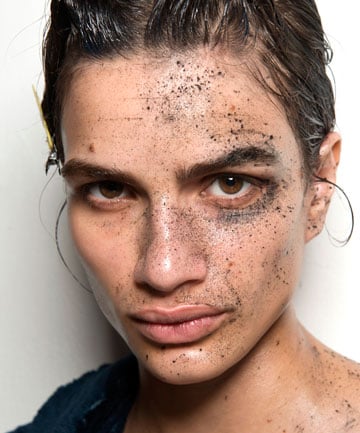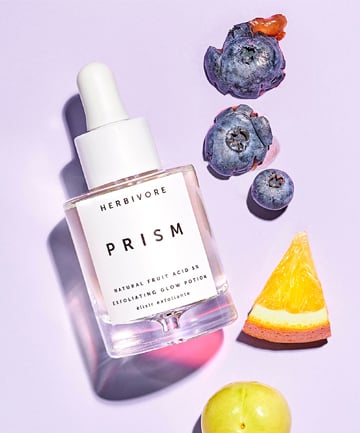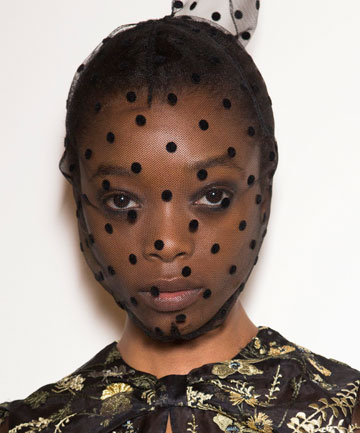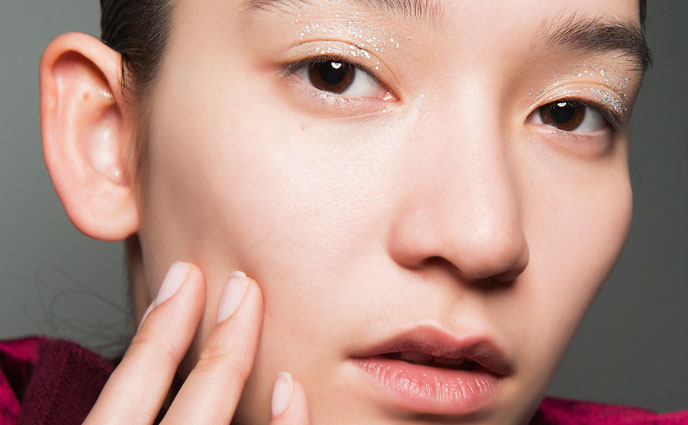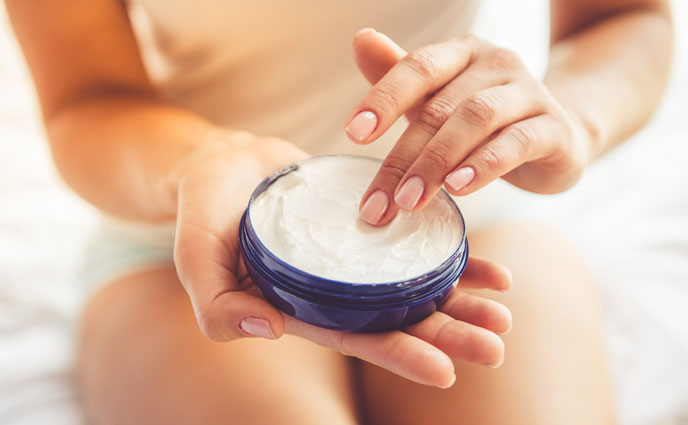Go ahead, run your fingers over your cheek or forehead. If your skin feels rough to the touch, that's a clear sign it's unbalanced. When rough texture becomes visible to the eye — usually via inflammation, uneven color or dry patches — that's a sign that things have really gone wonky. There are a few potential causes for this, including not enough moisture and infrequent exfoliation.
"Lack of exfoliation, or uneven exfoliation, can be a culprit for taking away our skin's own delicate natural balance," Shamban says. "As we age, the cellular turnover process slows down so exfoliating and removing the dead skin cells, debris and micropollutants, product or other environmental gunk is important to keep the systems functioning proficiently. Without this, the skin is out of balance."
Shamban adds that dehydration, both internal and external, can also create dry or flaky skin. "Our cells are mostly made up of water. If they are lacking or deficient, they start to shrink and lose their vibrancy," she says. "We need to be hydrated and to use products like hyaluronic acid, which will bind to the cells to prevent transdermal water loss restoring the healthy look and glow of a balanced complexion."
Image via Imaxtree
Consistent exfoliation is one of the quickest ways to fix rough and dry skin. Monthly “maintenance” facials are always helpful and the use of at-home exfoliators is also recommended.
Gentle physical exfoliators, such as Volition Beauty Turmeric Brightening Polish, $38, can be used about once weekly, and light chemical exfoliants, such as Herbivore Botanicals Prism Exfoliating Glow Potion, $62, can be used several times a week to help nix that dead cell buildup. (Really listen to your skin when you begin this sort of regimen to ensure you don't over-exfoliate, which can also lead to unbalanced skin.)
To help with dehydration, apply a moisturizing serum or oil, following by a cream, every morning and evening. Shamban specifically mentioned hyaluronic acid, which plumps up the skin for a hydrated, youthful look. A small amount of PCA Skin Hyaluronic Acid Boosting Serum, $115, can be added to any regimen (and even your sunscreen). Other moisturizing ingredients she recommends are ceramides and squalane. Ceramides help remedy aging-related skin laxity while squalane heals and moisturizes.
Image via Sephora
When we say dull, we're referring to skin that's lost its vibrancy and "glow factor." Sallow refers to skin that leans a bit yellow or brown instead of its true color. Sometimes these two go hand in hand, but other times you may experience only one or the other.
"A lack of nutrients to feed the skin, specifically lipids, which support skin structure, contribute to the dull, sallow look," Shamban says. "Lack of sleep can play its part too. Solid, sound sleep stops the body from producing excess cortisol which can cause inflammation getting skin out of balance. Long periods of rest help oxygenation and blood flow, so being sleep deprived can also contribute to a more sallow, dull complexion."
Image via Imaxtree
You can always slather on a luminizer or dust on a bronzer, but the true fix for dull and sallow skin isn't topical. It's all about treating your body right.
First, fuel your body appropriately. That means eating a diet that's low in sugar and processed foods and one that is rich in color, lean proteins and omega-3 fatty acids. If your diet is lacking, the assistance of supplements may be helpful. Some options include Perricone MD Omega 3 Supplements, $42, and 8Greens 8G Dietary Supplement, $14. Also, as Shamban mentioned, make sure to get your nightly beauty rest. Those zzzs are just as important as your momma (and dermatologist) told you they were.
Another thing that will help is consistent exercise, says Dr. Carl R. Thornfeldt, a board-certified dermatologist and the founder of Epionce. "Moderate exercise five times weekly for 20 to 35 minutes is very helpful for optimizing reparative blood flow to the skin," he notes. He adds that, while exercising outdoors can be beneficial, it's important to think about air quality and to take adequate measures to protect yourself. Also — don't forget your sunscreen (but you knew that).
Enlarged pores, oily skin you can't get a handle on, and consistent breakouts are all signs that your skin is unbalanced. Interestingly, the culprit behind oily skin (and subsequent breakouts) may actually be lack of moisture. That excess oil is often a response from your body saying, "We need moisture! Let's go into overdrive to produce some!"
Excess oil then fills pores, which makes them appear deeper and wider than normal. Then, when that oil mixes with dirt and bacteria, which is present on everyone's skin, you've got yourself a breeding ground for acne breakouts.
Those who are oil and acne-prone find themselves in an uncomfortable circle of scrubbing their skin and beating it into submission via aggressive products and regimens, which only exacerbates the problem.
Image via Imaxtree


